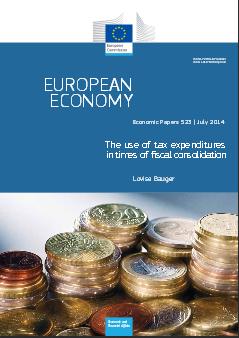Bauger, L. (2014) “The use of tax expenditures in times of fiscal consolidation“, European Economy, Economic Papers 523, Ιούλιος. Against the background of recovering growth and remaining fiscal consolidation needs, reforming tax expenditures may offer a promising avenue to raise revenue and, at the same time, improve efficiency of the tax systems. The workshop, held by DG ECFIN on 23 October 2013, addressed the economic and budgetary aspects of …Read More
The computerisation of European jobs – who will win and who will lose from the impact of new technology onto old areas of employment?
Bowles, J. (2014) “The computerisation of European jobs – who will win and who will lose from the impact of new technology onto old areas of employment?“, Bruegel Institute, 17 Ιουλίου. Who will win and who will lose from the impact of new technology onto old areas of employment? This is a centuries-old question but new literature, which we apply here to the European case, provides some interesting implications. …Read More
The European Council’s Guidelines for the Area of Freedom, Security and Justice 2020: Subverting the ‘Lisbonisation’ of Justice and Home Affairs?
Carrera, S. & Guild, E. (2014) “The European Council’s Guidelines for the Area of Freedom, Security and Justice 2020: Subverting the ‘Lisbonisation’ of Justice and Home Affairs?“, Justice and Home Affairs, CEPS Essays, 14 Ιουλίου. In its Conclusions of 26-27 June 2014, the European Council has adopted the new “Strategic Guidelines for Legislative and Operational Planning for the coming years within the EU’s Area of Freedom, Security and Justice …Read More
Making macroprudential regulation operational
Kashyap, K. A., Tsomocos, D. & Vardoulakis, A. (2014) “Making macroprudential regulation operational“, VoxEU Organisation, 18 Ιουλίου. Do the extant workhorse models used in policy analysis support macroprudential and macrofinancial policies? This column argues that this is not the case and describes a new macroprudential model that stresses the special role played by banks. The model also accounts for two, often neglected, key principles of the financial systems. Some …Read More
Why Juncker’s industrial goals are unlikely to be achieved
Wolff, Β. G. (2014) “Why Juncker’s industrial goals are unlikely to be achieved“, Bruegel Institute, 16 Ιουλίου. Instead of setting numerical goals, the new Commission president should focus on framework conditions, the single market and market failures ‘Industrial policy is back!’ This is the message given by the President Elect of the European Commission, Jean-Claude Juncker, at his confirmation by the European Parliament yesterday. In his speech, Juncker said …Read More
Trust and the welfare state: The twin-peaked curve
Algan, Y., Cahuc, P. & Sangnier, M. (2014) “Trust and the welfare state: The twin-peaked curve“, VoxEU Organisation, 17 Ιουλίου. It is commonly argued that the persistence of large welfare states in Scandinavian countries is due to the trustworthiness of their citizens. This column shows that the relationship between trust and the size of the welfare state is twin peaked. Untrustworthy individuals support generous welfare states because they expect …Read More
Trade policy issues in the Wider Europe – that led to war and not yet to peace
Emerson, M. (2014) “Trade policy issues in the Wider Europe – that led to war and not yet to peace“, EU Foreign Policy, CEPS Working Documents, 16 Ιουλίου. This paper looks at the trade policy landscape of the EU and the wider Europe, with a focus on issues arising from the signature on 27 June 2014 of Deep and Comprehensive Free Trade Agreements (DCFTAs) between the EU and three …Read More
The international role of the euro
ECB (2014) “The international role of the euro“, European Central Bank – Eurosystem, Ιούλιος. This report reviews developments in the international role of the euro in 2013, tracking a comprehensive set of indicators covering a number of different market segments. As in previous issues, the main focus is on measures of the euro’s relevance in financial markets, such as the use of the euro in foreign exchange reserves or …Read More
Did the German court do Europe a favour?
Mody, A. (2014) “Did the German court do Europe a favour?“, Bruegel Working Paper 2014/09, 15 Ιουλίου. The European Central Bank’s Outright Monetary Transactions (OMT) programme was a politically-pragmatic tool to diffuse the euro-area crisis. But it did not deal with the fundamental incompleteness of the European monetary union. As such, it blurred the boundary between monetary and fiscal policy. The fuzziness of this boundary helped in the short-term …Read More
The real lesson from the financial crisis is that we need to stop insulating financial regulation from democracy
Dorn, Ν. (2014) “The real lesson from the financial crisis is that we need to stop insulating financial regulation from democracy“, LSE EUROPP, 15 Ιουλίου. The financial crisis has generated a number of policies and discussions across Europe aimed at reforming financial regulation. Nicholas Dorn writes that while there is widespread recognition that a rethink is required to prevent a similar crisis from occurring again, the core problem underlying …Read More






